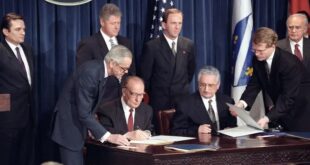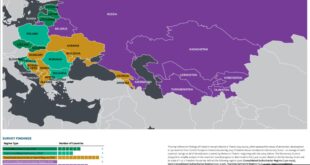 Serbia said on Wednesday it would shun any offer of membership of the European Union or NATO if they recognized the breakaway province of Kosovo as an independent state.Raising the stakes in the bid to block independence, the national assembly voted 220 to 14 in favor of a resolution saying Serbia would not sign any treaty that did not acknowledge its territorial integrity and sovereignty over Kosovo.
Serbia said on Wednesday it would shun any offer of membership of the European Union or NATO if they recognized the breakaway province of Kosovo as an independent state.Raising the stakes in the bid to block independence, the national assembly voted 220 to 14 in favor of a resolution saying Serbia would not sign any treaty that did not acknowledge its territorial integrity and sovereignty over Kosovo.
It was backed by President Boris Tadic and Prime Minister Vojislav Kostunica, leaders of the two main parties in Serbia’s centre-right ruling coalition, and supported by ultranationalist Radicals and Socialists on the opposition benches.
Focusing on the Stabilization and Association Agreement that Serbia may sign with the EU next month, the resolution said “any treaty Serbia signs, including the SAA, must be in keeping with preservation of (its) sovereignty and territorial integrity”.
Serbia would shelve a decision on NATO membership, it said, and it would oppose a EU supervisory mission preparing to take over from the United Nations in Kosovo unless it won Security Council approval — which Russia has already blocked on behalf of its Serb ally.
Rhetoric in the debate was patriotic and defiant. But several speakers complained the resolution’s wording was vague, perhaps deliberately so to permit harder or softer interpretation at a later date, depending on events.
“Serbia will never accept the independence of Kosovo,” Tadic told parliament. The diplomatic campaign against it would resume at a U.N. Security Council session on January 9.
If NATO peacekeepers failed to protect Kosovo’s minority Serbs, “the Serbian Army is ready”, he added in a tough note possibly meant to help his current campaign for re-election.
Kostunica, usually the more combative of the two, said the resolution would “send a message to Serbs in Kosovo … that they should ignore any unilateral declaration of independence”.
Most Serbs live in the north of Kosovo, in effect already partitioned from land dominated by the 90-percent Albanian majority, who are preparing to declare independence in the first months of 2008 with U.S. and EU backing.
Analysts say a Serb partition would be hard to prevent, assuming any side really wanted to prevent it.
CYNICAL TONE
A senior government source said Wednesday’s resolution was a political necessity to preserve Serbia’s fragile coalition during the January presidential campaign. He said the EU had been reassured that it did not signify a change of course.
Pro-Western Foreign Minister Vuk Jeremic said he hoped Serbia would sign the SAA by the end of January, regardless of the resolution, but also without ceding sovereignty over Kosovo.
Hardliners were cynical about the coalition’s sincerity.
Kostunica’s speech “sounded like a lullaby, like anesthesia before the amputation”, said Tomislav Nikolic of the Radicals.
“We’re going to vote for this resolution, but you owe us an explanation. Does it mean you’ll approve signing the agreement with the EU even if it doesn’t say Kosovo belongs in Serbia?”
The Socialist Party of the late autocrat Slobodan Milosevic, held chiefly responsible for disastrous wars in Croatia, Bosnia and Kosovo in the 1990s, also sounded a sarcastic note.
Socialist leader Ivica Dacic said his party would fully support the resolution, but added: “Why did you overthrow us?”
Serbia lost control of Kosovo in 1999 after 11 weeks of bombing by NATO forced Milosevic to withdraw his troops, ending a ruthless counter-insurgency campaign in which 10,000 civilians were killed and 800,000 driven out of the country.
Kosovo has been run by the United Nations and patrolled by a major NATO-led peacekeeping force ever since. Serbia now offers Kosovo’s 2 million Albanians broad autonomy, “a separate life” with no role in Serbia, but short of full self-determination. Kosovo insists on total independence.
 Eurasia Press & News
Eurasia Press & News



